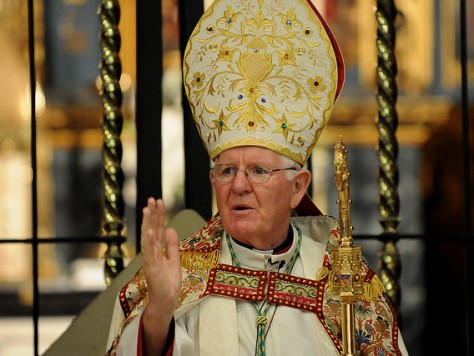A popular Catholic blog, Protect the Pope, will close tomorrow after the Bishop of Lancaster refused to let its author continue writing. The blog, written by Deacon Nick Donnelly, was set up prior to Pope Benedict XVI’s visit to the UK in September 2010 to fight back against the constant attacks on the pontiff by the mainstream media.
After Pope Benedict’s visit, the blog became a staunch defender of orthodox Catholic teaching, criticising dissenting liberals. In March this year, however, Donnelly, who serves as a Permanent Deacon in the Diocese of Lancaster, announced that he had been asked to stop writing the blog by the Bishop of Lancaster, who told him to undergo a period of “prayer and reflection“.
The Deacon’s wife, Martina, continued posting on the site, but finally announced on Tuesday that the bishop “stated that he does not want anyone posting on Protect the Pope on Nick’s behalf.” The website will close tomorrow.
Deacon Nick told the Catholic Herald: “I am sad and disappointed that Bishop Campbell will not give his permission for me to return to running and posting on Protect the Pope.”
“On Protect the Pope I have only ever defended the Faith of the Church from dissent and disobedience.
“Though I do not understand the grounds on which Bishop Campbell has made his decision about Protect the Pope I will obey because I take seriously the promise I made when I was ordained. If I didn’t obey him I’d be no different from the dissenters who rebel against the doctrines of the Church and disobey her discipline.”
Bishop Michael Campbell issued a statement, however, saying that he did not close the blog down.
“It is my view that bishops, priests and deacons of the Church – ordained and ‘public’ persons – are free to express themselves and their personal views, but never in a way that divides the community of the Church, ie through ad hominem and personal challenges.
“Increasingly I have felt that Protect the Pope, authored as it is by a public person holding ecclesiastical office (an ordained deacon), has, at times, taken this approach its own posts – but has also allowed for this by facilitating those who comment online.
He adds:
“On several occasions, I asked Deacon Nick, through my staff, for Protect the Pope to continue its good work in promoting and teaching the Catholic Faith, but to be careful not to take on individuals in the Church of opposing views through ad hominem and personal challenges. Unfortunately, this was not taken on board.
“Consequently, as a last resort, on March 3 and in a personal meeting with Deacon Nick Donnelly, I requested, as his Diocesan Ordinary, that Deacon Nick ‘pause’ all posting on the Protect the Pope website so as to allow for a period of prayer and reflection upon his position as an ordained cleric with regards to Protect the Pope and his own duties towards unity, truth and charity.
The bishop went on to deny that he had closed the blog down, and criticised the fact that the blog had told its readers that Deacon Donnelly had been asked to take a break, saying this had led to situation being “misinterpreted”.
Last month, another priest-blogger wrote in support of Protect the Pope. Father Timothy Finigan, who writes the Hermeneutic of Continuity, said:
“I do wonder about the practical wisdom of attempting to censor the blogosphere. Protect the Pope now carries posts by Mrs Donnelly, and she has offered an invitation to others to contribute material – which several writers have already taken up. Other censored bloggers can also simply start up a new blog under a pseudonym, or use alternative social media platforms – Facebook and Twitter are well-known but the possibilities are endless.
“As activists on the internet pointed out years ago, censorship is just another bug for which you find a hack or a workaround. The danger is that a previously censored commenter will be probably not be inclined to moderation in a new social media incarnation.”

COMMENTS
Please let us know if you're having issues with commenting.